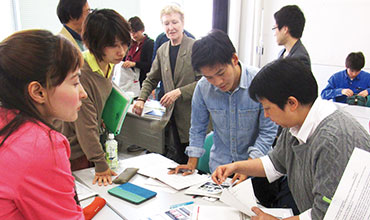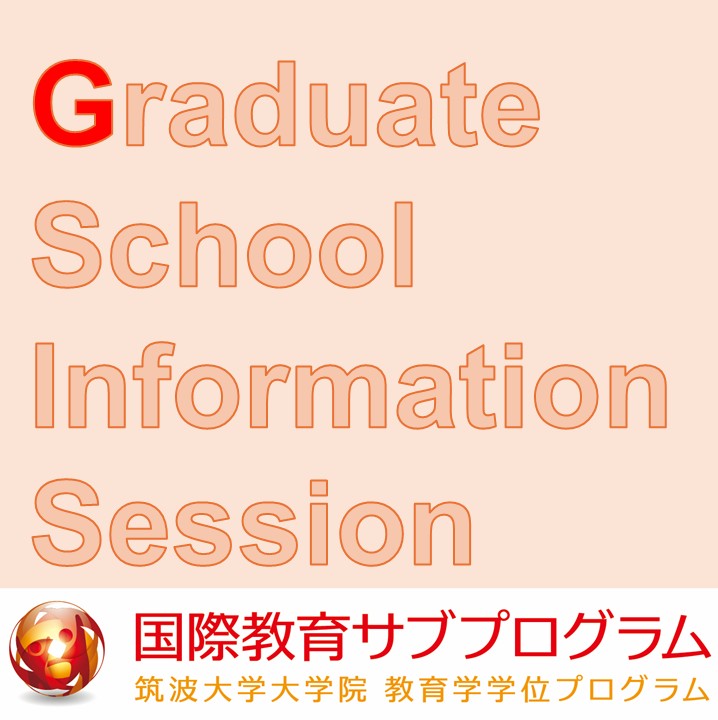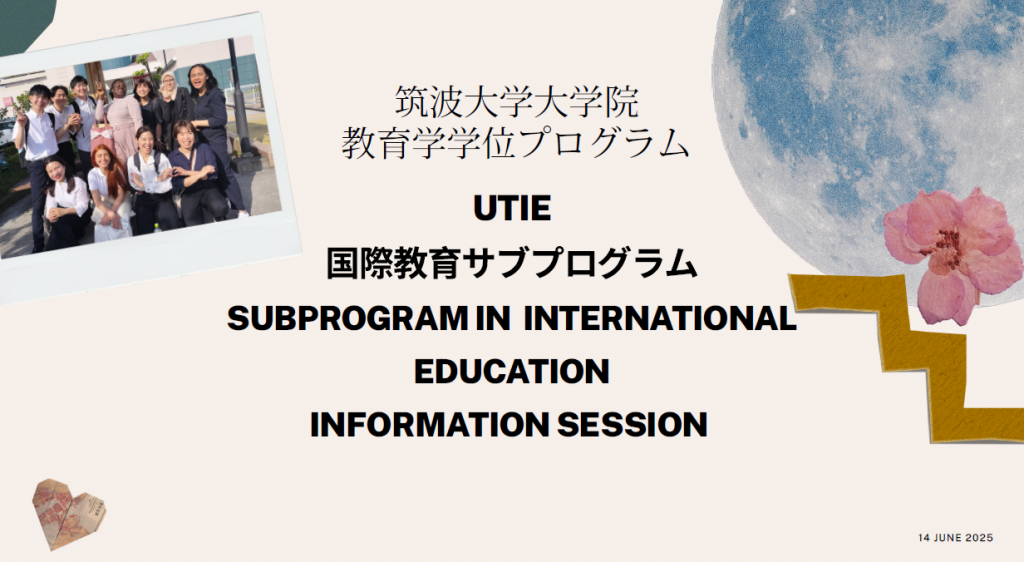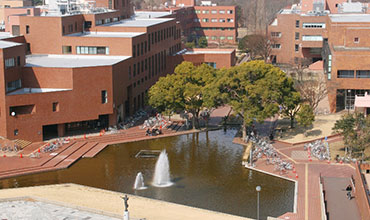Master’s Program in Education
- Degree Programs in Education, The College of Education, University of Tsukuba(HOME)
- Master’s Program in Education
The three subprograms: the gateways to highly professional researchers, administrators and practitioners in various fields of education
※The Subprogram in School Education for Next-generation and the Subprogram in Education Science are basically taught in Japanese.
Subprogram in International Education
In this page, we will introduce Subprogram in International Education, where you can study in English.
A short Introduction Video About the Subprogram in International Education
Academic Degrees and Qualifications
- Master of Arts in Education
- Special teaching certificate for elementary school, Special teaching certificate for junior high school (all subjects), Special teaching certificate for high school (all subjects), Special teaching certificate for nursing homes, Special nutrition teaching certificate, school psychologist, School psychologist, IB educator certificates (IBCTL, IBACTLR), etc.
Curriculum
- Requirements for Completion
Students of the Master’s Program in Education must earn the specified credits (30 credits) after studying more than two years and submit a master’s thesis or report on practical research. You must pass the assessment and final examination after the necessary research guidance.

Students who enrolled through the special screening for working individuals can attend exceptional courses so that they can complete regular graduate courses while continuing work. That is, students who wish to study exceptional courses must take 24 credits through daytime courses offered in the first year. For the second year, students must take 6 credits through courses offered in the evening.
Those who have achieved outstanding results and also have acquired the credits set forth separately and passed the master’s thesis and final examination shall be eligible to shorten the period of enrollment to at least one year.
The requirements for the completion of the one-year program for incumbent teachers are different from those of the special screening for working individuals.
- Class Subjects
Students must earn at least 3 credits from the Foundation Subjects of Graduate School Common Foundation Courses.
・Study on Educational Theory
・Study on Educational Development for Next Generation
・Theory of International EducationStudents must earn at least 18 credits from the Foundation Subjects for Major (Compulsory Elective Subjects).
Students must earn at least 9 credits from the Major Subjects (Compulsory Elective Subjects). University’s electronic course catalogue is called KdB. https://kdb.tsukuba.ac.jp/
Staff and Faculty
Many faculty members are involved in this program and provide academic guidance in each field.
In addition to these faculty member in charge, many cooperating professors and adjunct professors are involved in the lectures, seminars and individual academic guidance.
Please Look at Staff Page of Education.
Find University of Tsukuba faculty and researchers’ information using TRIOS. You can search by name, research field and affiliation.
– List by affiliations: To faculty and researchers by affiliations
– List by research fields: To faculty and researchers by research fields
– Keyword search: To faculty and search researchers by specifying other conditions
The List below is the faculty members of the Subprogram in International Education:
| Name | Official title | Detailed Description of Research Field |
|---|---|---|
| Hirofumi Hamada | Professor | School Management in the U.S.A. and Japan, Teacher Education, School Improvement |
| Teruyuki Fujita | Professor | Career Education, Educational and Vocational Guidance |
| Kuanysh Tastanbekova | Associate Professor | Language education policy for indigenous, immigrant and ethnic minority; Multicultural education; Education policy in Central Asian Republics; Education policy of international organizations |
| Masahiro Tanaka | Associate Professor | Quality Assurance in Higher Education |
| Tomoko Tokunaga | Associate Professor | Sociology of Education |
| Shizuko Umetsu | Assistant Professor | Comparative Education, IB education |
| Kaori Kikuchi | Assistant Professor | Globalization and Education, Education Policy in the UK, Citizenship Education, Education for Immigrant Children, Education for International Understanding |
| Yuichi Furuta | Assistant Professor | Educational Policy and School Improvement |
| Wakana Kawakami | Assistant Professor | Moral Education |
Admission Information
In addition to the general entrance examination, admission by various selection methods is implemented.
Please see the “University of Tsukuba Graduate Admissions” website concerning, entrance examination dates, examination subjects, etc.
Graduate Admissions 2022
Subprogram in International Education
October (General Admission/ Special Selection of Working Individuals/ Special Selection for English Speakers and Overseas Japanese Nationals)
Application guidelines for the Special Selection for English Speakers and Overseas Japanese National are here.
*The application starts in September. Please check the application guidelines carefully.
The collection of past Entrance examination (the special selection for English speakers and overseas Japanese nationals) is here.
AY2022 AY2021 AY2020
*The Essay in the Special selection process for English speakers and overseas Japanese nationals is abolished from AY2025 .
The information session by the Master’s program in Education

2025 Information Session: Subprogram in International Education
We are excited to invite you to an upcoming information session hosted by the Subprogram in International Education, one of the specialized tracks within the Master’s Program in Education at the Graduate School of Comprehensive Human Sciences, University of Tsukuba.
This session is a great opportunity for prospective students to learn more about this graduate-level program with a strong international focus.
Our faculty members and current students will introduce the distinctive features of the Subprogram, share their experiences, and answer your questions in an open and friendly setting.
If you’re interested in advancing your academic journey in a diverse and global environment, this is your first step!
📍 Venue
Blended Format:
Online (ZOOM)
On-Campus (University of Tsukuba, Tsukuba Campus) 8B Building
Access Information →https://maps.app.goo.gl/RWxRje9iLCmTp1DN7
⌚ Date & Time
Saturday, June 14th
13:00 – 15:00 (JST)
Reception: 12:30~
📝 Registration
Please register in advance using the form below:
👉 https://forms.gle/rTu84DUezQvJPSdc9
Join us and discover how the Subprogram in International Education can support your goals in global education and research.
We look forward to welcoming you!
★The information session has concluded. We appreciate your participation.
The presentation materials are available for download by clicking the image below.
↓↓↓↓
Typical Career Paths

・Subprogram in International Education
Many of those who completed the Subprogram gain employment with domestic and overseas, public and private IB World Schools (at all three levels) and international schools. Furthermore, there are also those who are with universities that provide an IB teacher training course and who are on the path to research in universities. In addition, there are those who are active in various areas related to international education including engaging in academic administration.
The Results of AY2019 Teacher:5(Including IB World School, International School, and English Teachers), Return to teacher work:1, Government office& Company etc.:2, , Other:1
・Subprogram in School Education for the Next Generation As career courses after the completion of the Doctoral Program, there is a wide choice of options from administrative agencies including domestic and overseas education-related organizations such as domestic and overseas educational administration, schools (teachers), social education administration and life-long learning agencies, and NPOs, international agencies, domestic and overseas universities, research agencies, and others.
The Results of AY2019 Teacher:41, Return to teacher work:3, Government office& Company etc.:14, Going on to the Doctoral Program of Education and other advancedschools:4, Other:1
・Subprogram in Education Sciences The majority of the students studied in the Subprogram in Education Sciences will be researchers engaged in education and research in the various branches of education administration in domestic and overseas universities, research agencies, and so forth. Most of them advance to the Doctoral Program in Education,. However, in recent years, there is an increasing number of those entering the graduate school in different disciplines in University of Tsukuba or other universities, and becoming junior and senior high school teachers, public service workers, business people, and so on.
The Results of AY2019 Teacher:0, Return to teacher work:0, Government office& Company etc.:5, Going on to the Doctoral Program of Education and other advanced schools :8, Other:1
The above is the data for the graduates from the courses of old organization in AY 2019.
Contact Us
If there are any questions you want to ask, please use “Contact Form”.
You can also refer Frequently Asked Questions
Information
University of Tsukuba(Japanese Website)
University of Tsukuba(English Website)
Student Handbook
Master’s Program in Education(Japanese website)
Course catalogue


